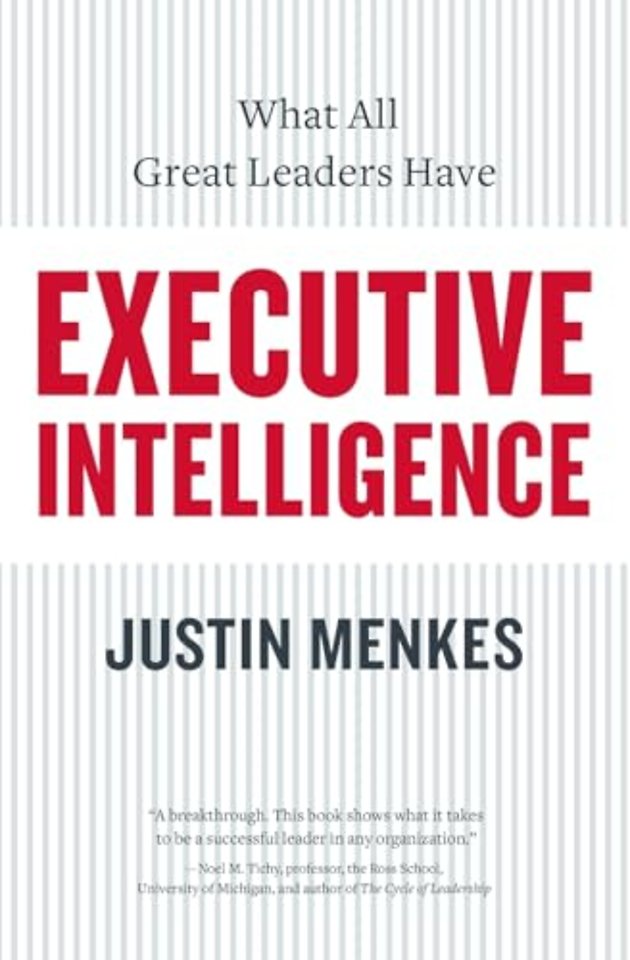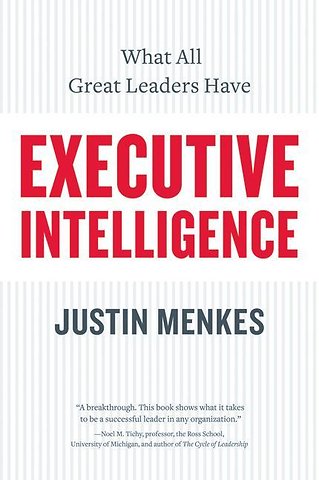


Justin Menkes is a managing director of the Executive Intelligence Group (EIG), a leading provider of executive assessment services to global corporations.
Meer over Justin MenkesExecutive Intelligence
What All Great Leaders Have
Samenvatting
This work presents the final word on what traits make for highly successful managers and a detailed explanation of how to identify potential standout performers. "Executive Intelligence" is about the substance behind great leadership. Inspired by the work of Peter Drucker, who first identified the attributes of effective executives, and Jim Collins, who showed the paramount importance of getting the right management team together before finding the right strategy, Justin Menkes set out to isolate the qualities that make for the 'right' people.
In a sense, Menkes work reveals an executive IQ, the cognitive skills necessary in order to excel in senior management positions. Contrary to our popular assumptions, star leaders have many different sorts of interpersonal styles, they are not all warm, empathetic, or overtly charismatic. But they do have one common, consistent trait, they are all sharp.
And they are sharp in the specific ways that constitute "Executive Intelligence": they readily differentiate primary priorities from secondary concerns; they identify flawed assumptions; they anticipate the different needs of various stakeholders and how they might conflict with one another; and they recognize the underlying agendas of individuals in complex exchanges. Menkes is a passionate advocate for finding and employing the most talented people, especially those who may have been held back by external assumptions.
Specificaties
Inhoudsopgave
The Beginning xvii
What Every Business Needs xix
Where Things Went Wrong xxi
SECTION I: WHAT IS EXECUTIVE INTELLIGENCE-AN OVERVIEW
CHAPTER 1
Part One: Making the Invisible Visible 3 (4)
Part Two: Executive Intelligence in Real Life 7 (14)
Part Three: Executive Intelligence Explains Business Smarts 21 (4)
Chapter 1 Summary 25 (2)
CHAPTER 2
Part One: Critical Thinking The Foundation of Executive Intelligence 27 (4)
Part Two: Critical Thinking Applied to Business 31 (6)
Chapter 2 Summary 37 (2)
CHAPTER 3
Part One: Discovering Executive Intelligence 39 (12)
Part Two: The Broad Reach of Executive Intelligence 51 (4)
Chapter 3 Summary 55 (2)
CHAPTER 4
Part One: The Competitive Advantage: Why Certain People Make the Difference 57 (8)
Part Two: It Takes One to Know One 65 (6)
Chapter 4 Summary 71 (2)
CHAPTER 5
Beyond Ideas: How Great Results Happen 73 (8)
Chapter 5 Summary 81 (4)
SECTION II: WHY IS EXECUTIVE INTELLIGENCE SO RARE?
CHAPTER 6
Part One: The Executive Intelligence Gap 85 (4)
Part Two: No Time to Think The Myth About Speed 89 (6)
Part Three: Action Without Thought The Reality of Executive Behavior 95 (10)
Chapter 6 Summary 105 (2)
CHAPTER 7
Part One: Blame It on the Brain 107 (4)
Part Two: Connectionism 111 (4)
Part Three: Common Errors of Business Judgment 115 (18)
Chapter 7 Summary 133 (4)
SECTION III: INTELLIGENCE IS THE KEY
CHAPTER 8
Part One: Beyond Academic Intelligence 137 (2)
Part Two: How Intelligence Measures Are Created 139 (4)
Part Three: The Changing Notions of Intelligence 143 (2)
Part Four: IQ Tests and Managerial Work 145 (6)
Part Five: Creating an Appropriate Executive IQ Test 151 (4)
Chapter 8 Summary 155 (2)
CHAPTER 9
Part One: Taking a Wrong Turn 157 (6)
Part Two: The Charisma Trap 163 (4)
Part Three: A Cult of Personality 167 (6)
Part Four: Style and Personality: The Ongoing Distraction 173 (4)
Chapter 9 Summary 177 (2)
CHAPTER 10
The Cycle of Indirect Measures A Revolving Door 179 (8)
Chapter 10 Summary 187 (2)
CHAPTER 11
Part One: The Evolution of the Job Interview 189 (4)
Part Two: A Step in the Right Direction 193 (2)
Part Three: The Limits of Past Behavioral Interviews (PBIs) 195 (2)
Chapter 11 Summary 197 (2)
CHAPTER 12
Part One: The Mystery of Past Behavioral Interviews 199 (6)
Part Two: What Do PBIs Actually Measure? 205 (8)
Chapter 12 Summary 213 (2)
CHAPTER 13
The Difference Between Knowledge and Intelligence 215 (6)
Chapter 13 Summary 221 (2)
CHAPTER 14
Part One: How Does One Measure Intelligence? 223 (8)
Part Two: Test Format A Crucial Ingredient 231 (6)
Chapter 14 Summary 237 (4)
SECTION IV: HOW DO YOU MEASURE EXECUTIVE INTELLIGENCE?
CHAPTER 15
Part One: Distinguishing Excellence 241 (16)
Part Two: Executive Intelligence Validation Behind the Theory 257 (4)
Chapter 15 Summary 261 (2)
CHAPTER 16
Teaching and Developing Executive Intelligence 263 (10)
Chapter 16 Summary 273 (2)
CHATPER 17
Valuing Executive Intelligence 275 (8)
Appendix 283 (2)
Notes 285 (10)
Index 295
Anderen die dit boek kochten, kochten ook
Net verschenen
Rubrieken
- aanbestedingsrecht
- aansprakelijkheids- en verzekeringsrecht
- accountancy
- algemeen juridisch
- arbeidsrecht
- bank- en effectenrecht
- bestuursrecht
- bouwrecht
- burgerlijk recht en procesrecht
- europees-internationaal recht
- fiscaal recht
- gezondheidsrecht
- insolventierecht
- intellectuele eigendom en ict-recht
- management
- mens en maatschappij
- milieu- en omgevingsrecht
- notarieel recht
- ondernemingsrecht
- pensioenrecht
- personen- en familierecht
- sociale zekerheidsrecht
- staatsrecht
- strafrecht en criminologie
- vastgoed- en huurrecht
- vreemdelingenrecht





